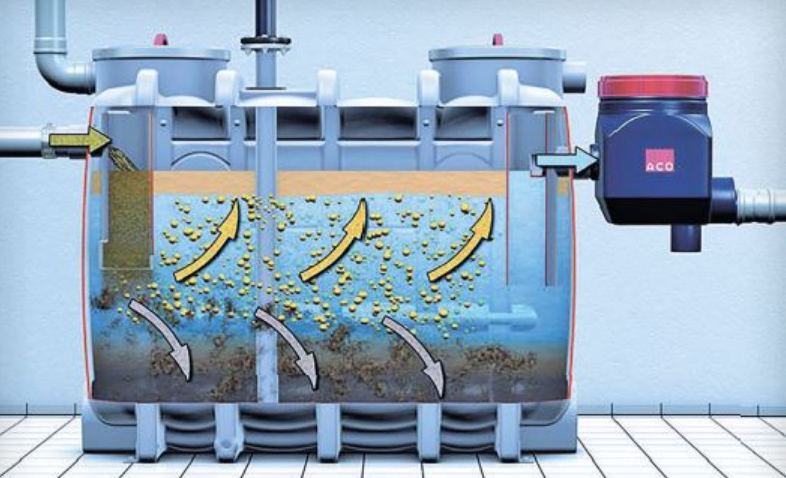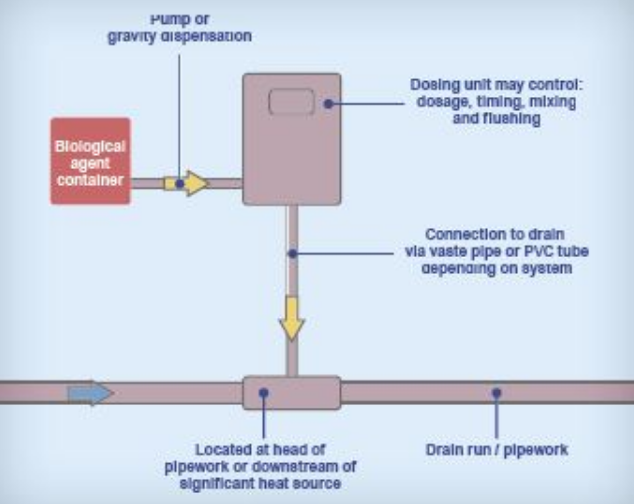Grease management

|
| ACO Gravity Grease Separator (ACO, 2017) |
Dealing with the problems of FOGs (Fats, Oils and Greases) entering our sewer system and measures that can be implemented to change the UK dosing systems to removal systems.
Contents |
[edit] Introduction
The UK experiences 366,000 sewer blockages every year flooding more than 3,000 properties through the accumulation of Fats, Oils and Greases (abbreviated to FOGs), all originating from domestic, commercial or industrial premises (Water UK 2017). This in turn costs the UK approximately £15 million to clear; financed mainly by the utility companies. These costs are then passed on to the consumer in the form of higher bills (CIBSE 2014). Clearly this is a problem that needs to be addressed.
[edit] UK Legislation unable to tackle the problem
The very vague and ineffectual UK regulations and legislation must bear much responsibility. Approved Document H offers little relief in its content stating; “…drainage serving kitchens in commercial hot food premises should be fitted with a grease separator complying with BS EN 1825-1 and designed in accordance with BS EN 1825-2 or other effective means of grease removal”. This has simply encouraged contractors to install dosage systems to push the problem downstream and push the cost on to the utility companies.
[edit] The Solutions: Dosage Versus Grease Separation

|
| Dosing System Components (British Water, 2017) |
One example of a dosage system is shown in the illustration above. It is the preferred method amongst UK contractors and retailers as it is easy to install and retrofit, space is saved and it is the cheapest option to implement. However, as waste water moves down the sewer network, FOGs can still regroup and impede waterflow.
More effective are the grease separation systems exemplified by the ACO Grease Separator (ACO, 2017). FOGs and wastewater are separated within a chamber and the water is cooled sufficiently to allow the FOGs to harden and the wastewater to be pumped away down the discharge sewer pipes devoid of any hardened FOGs. Clearly this is a much more effective system. With an improvement in UK legislation, updated building regulations, establishment of FOG concentrate levels and better enforcement, the £15 million cost of managing FOGs will be reduced significantly.
[edit] FOG Treatment Abroad
Clearly the occurrence of FOG blockages has been recognised as a major issue and other countries have been far more proactive in tackling the problem. Canada, Germany and the US have all implemented FOG concentrate limits of between 100 and 300 mg per litre of wastewater (Growdon 2017). These are then regularly sampled and inspected and when limits exceed these, heavy fines are levied on the offending outlet company.
As a result their sewer systems are much clearer.
This article was written by Luke Clapp (Hoare Lea), Tomasz Rosinski (Hoare Lea) and Joshua Gallagher (WSP). It was originally published by BSRIA in December 2018 at: https://www.bsria.co.uk/news/article/grease-management-treatment-or-removal/
--BSRIA
[edit] Related articles on Designing Buildings Wiki
- BSRIA articles on Designing Buildings Wiki.
- BSRIA.
- Clarified water.
- Drainage.
- Maintenance of drainage systems to prevent flooding and water pollution.
- Pipework.
- Public sewer.
- Safe ductwork - Loss Prevention Standard (LPS 2084).
- Safe working in drains and sewers.
- Sewer construction.
- Sewerage.
- Sustainable urban drainage systems SUDS.
- Water transfers and interconnections.
Featured articles and news
Tackle the decline in Welsh electrical apprenticeships
ECA calls on political parties 100 days to the Senedd elections.
Resident engagement as the key to successful retrofits
Retrofit is about people, not just buildings, from early starts to beyond handover.
What they are, how they work and why they are popular in many countries.
Plastic, recycling and its symbol
Student competition winning, M.C.Esher inspired Möbius strip design symbolising continuity within a finite entity.
Do you take the lead in a circular construction economy?
Help us develop and expand this wiki as a resource for academia and industry alike.
Warm Homes Plan Workforce Taskforce
Risks of undermining UK’s energy transition due to lack of electrotechnical industry representation, says ECA.
Cost Optimal Domestic Electrification CODE
Modelling retrofits only on costs that directly impact the consumer: upfront cost of equipment, energy costs and maintenance costs.
The Warm Homes Plan details released
What's new and what is not, with industry reactions.
Could AI and VR cause an increase the value of heritage?
The Orange book: 2026 Amendment 4 to BS 7671:2018
ECA welcomes IET and BSI content sign off.
How neural technologies could transform the design future
Enhancing legacy parametric engines, offering novel ways to explore solutions and generate geometry.
Key AI related terms to be aware of
With explanations from the UK government and other bodies.
From QS to further education teacher
Applying real world skills with the next generation.
A guide on how children can use LEGO to mirror real engineering processes.
Data infrastructure for next-generation materials science
Research Data Express to automate data processing and create AI-ready datasets for materials research.
Wired for the Future with ECA; powering skills and progress
ECA South Wales Business Day 2025, a day to remember.
AI for the conservation professional
A level of sophistication previously reserved for science fiction.























